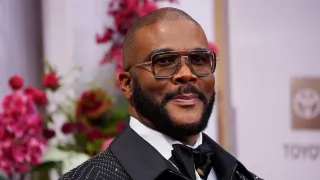December 12, 2015
Gaga, Missy Elliott in Tears After Getting Billboard Honors
Mesfin Fekadu READ TIME: 3 MIN.
Lady Gaga and Missy Elliott were in tears Friday as they discussed the struggles they faced in their careers at an event honoring women in the music industry.
Gaga was named Billboard's woman of the year, while Elliott - who has largely stayed out of the spotlight in recent years, save for a surprise Super Bowl appearance, but returned last month with a new single - was dubbed innovator of the year.
Loretta Lynn, Demi Lovato, Selena Gomez, Brittany Howard of Alabama Shakes, Lana Del Rey, girl group Fifth Harmony, pop singer Tori Kelly and country singer Kelsea Ballerini were also honored at the event, along with 50 female music executives.
The Billboard Women In Music event, which included guests like Alicia Keys, Paul Rudd, Martina McBride and Jussie Smollett from "Empire," will air Dec. 18 on Lifetime.
___
TEARS OF JOY
Gaga - who earned a Grammy nomination Monday and a Golden Globe nod on Thursday - grew emotional onstage when she spoke about her struggles to find her voice in the industry.
"It's really hard sometimes for women in music. It's like a (expletive) boys club we can't get into. Sorry grandma," she said. "I've tried for so long. I just wanted to be taken seriously as a musician."
Gaga was introduced to the stage by her mother, Cynthia Germanotta, who said piano lessons as a child helped the pop star discover her gift for music. The singer ended her speech with strong words for those who doubted her in the past: "But I can write songs and I can sing."
Elliott, too, was emotional in a 6-minute speech that earned a standing ovation louder than any other Friday afternoon. The rapper, who recently returned with the single "WTF (Where They From)" after years away from the spotlight, cried throughout her speech.
"I was that kid that used to write on my mother's walls ... I just had songs written all over the walls ... (and) as time went on I realized I was different and unique and not a follower," she said. "I've had my ups and downs, there's times I've wanted to give up, but God had another plan for me and if it had not been for him, I would not be standing here."
She went on to thank Janet Jackson for being a dependable friend and also paid tribute to her late friend, R&B singer Aaliyah.
"And Aaliyah I hope you're looking down and proud of me," she said.
___
AND THE NOMINEES ARE ...
Billboard's event also gave the leading ladies a chance to celebrate their Grammy nominations, which were announced Monday.
And while Gaga earned a Grammy nod for best song written for visual media for "Til It Happens To You" - from the sexual assault documentary "The Hunting Ground" - she was also rejoicing because of her Golden Globe nomination for acting.
"It feels great because I really care about my work as an actress and I spend a lot of time on it and you never know if people can see that or if they just think, 'You're a musician who wants to do everything,' and that's not me at all," said Gaga, whose role on FX's "American Horror Story: Hotel" earned her a nomination for best actress in a miniseries or motion picture made for television. "I love acting and I put so much of myself into it when I'm working, so to be recognized is so amazing."
Alabama Shakes earned four Grammy nominations, including album of the year and best alternative music album for "Sound & Color" as well as best rock performance and rock song for "Don't Wanna Fight."
"I hope I can be like Adele," band leader Howard said, holding her arms like Adele did when she won six Grammys in 2012. "Cradle all my babies."
Kelly, who released her debut album this year, is competing for best new artist.
"It's honestly the craziest thing to me. This is by far the craziest year of my life," she said.
___
SISTERS WITH VOICES
Lovato, who earned Billboard's rulebreaker award, hit a high note so perfectly that the audience applauded loudly before she could even finish her song.
The singer sang the tune "Stone Cold" with emotion and passion that filled the entire room - much like her peers.
Kelly was on guitar as she belted "Hollow" in strong form, and Howard was top notch when she sang "Joe." And Gaga closed the event with a performance of "Til It Happens to You" on piano.
Fifth Harmony was in sync as they performed a stripped down version of their hit "Worth It." It was followed by a cover of Destiny's Child's "Independent Woman" - fitting for Friday's event.






